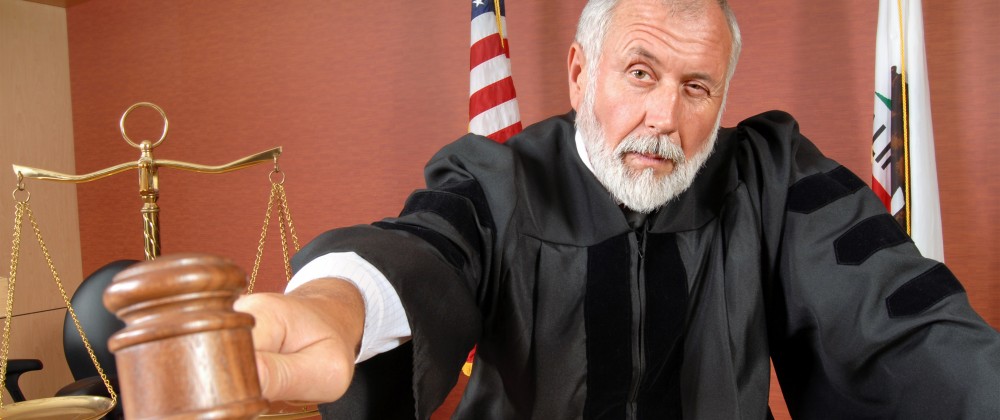The recent decision by United States District Court Judge David Bunning to hold Rowan County (Kentucky) Clerk, Kim Davis, in contempt of court and place her in jail has set off one of the greatest firestorms of debate in recent memory. As most people know, Ms. Davis refused to issue marriage licenses to same-sex couples seeking to wed, citing her strong religious objection to same-sex marriage. Having first filed suit herself (against the Governor of Kentucky), essentially seeking approval of her plan of to refuse same-sex licenses, and having lost her suit at both the district court and appellate court levels, she nevertheless proceeded as planned, ignoring the rulings against her. Thereafter, when specifically ordered by Judge Bunning to fulfill her official duties as clerk and issue licenses to everyone, including same-sex couples, she simply refused to do so, leading Judge Bunning to find her in contempt and place her in jail until she agrees to comply. While most Americans would be fired for willfully refusing to do their jobs as assigned, as an elected official, Ms. Davis is not subject to such termination, but can only be impeached from her office. It may ultimately come to that, although it remains to be seen if the Kentucky legislature will pursue that action, and they are not even back in session until January. Of course, Ms. Davis has the option of resigning her position if she doesn’t want to handle the tasks of her job, but apparently she otherwise enjoys her $80,000/yr position, and simply wants to choose what parts of the job meet with her personal moral code. Unfortunately for Ms. Davis, that simply isn’t the way the world works.
The quotes from her supporters, and from those in the country who generally oppose same-sex marriage, raise rhetorical claims as bold as stating that she is being “jailed for her religious beliefs” and is being “persecuted”. Republican Presidential candidate Mike Huckabee called her arrest the “criminalization of Christianity”. In fact, her attorney said “Today, for the first time in history, an American citizen has been incarcerated for having the belief of conscience that marriage is the union of one man and one woman.” Realizing that legal counsel are supposed to advocate for their client, I can forgive that hyperbole, but his statement, of course, is patently wrong. She was placed in jail for contempt of court, not her own beliefs, which she remains free to have and to espouse from the highest mountain. In fact, there is nothing wrong with her handing over a license to a same-sex couple while verbally preaching the inappropriateness of their relationship – as long as she fulfills her job duties and gives them the license for which they paid.
The foundation of the problem is that people like Ms. Davis, who vehemently oppose same-sex marriage because of their religious beliefs, want to claim that their religious values trump the laws of our country. One writer, David French, suggests that Ms. Davis’ actions were appropriate because the United States Supreme Court’s decision in Obergefell v. Hodges (which held same-sex marriage to be valid and legal under the 14th Amendment) was itself illegitimate, so those who disagree with it should simply ignore it and act as they wish. In fact, he pointedly states that Ms. Davis should neither resign her position nor comply with the law, but “resist”, because of his belief that the Supreme Court’s ruling in Obergefell is illegitimate.
Following the line of reasoning of Ms. Davis’ supporters, any American who disagrees with a statute, regulation, court decision or policy would be allowed to simply refuse to follow it, at least if they can cite that their strong moral and religious beliefs dictate that they do so. The inherent failure of that logic is that once we start allowing anyone to simply cite his or her “religious beliefs” in order to ignore, subvert or just plain violate the law, that ultimately leads to anarchy. Many of the same people who support Ms. Davis’ actions because of their strong Christian beliefs would be appalled if a similarly elected county clerk elsewhere cited his strong religious beliefs (pick the religion….Islam, Judaism, Buddism, Druidism.…it doesn’t matter which) to refuse to issue hunting licenses, gun licenses, housing permits, etc. One current satirical picture making the social media rounds shows a purported note posted by a “Muslim” clerk, contending that his religious beliefs forbid him to issue driver’s licenses to females. Ridiculous? Sure. But ultimately it is the exact same principle. Likewise, some of the same people who support Ms. Davis today were likely outraged by the actions of Cassius Clay (a/k/a Muhammad Ali) when he refused to submit to the draft because of his religious (Muslim) opposition to the Vietnam War, leading to his prosecution. Just as in this case, many of Ali’s supporters felt he was being persecuted. Different religion, different time, different issue, different opinions…SAME concept. It just depends on whether it is your particular belief that’s the flavor-of-the-day.
One of the reasons our founding fathers established separation of church and state in our Constitution was so that our country would not be run by one particular religious group or another, and that no other religious group might be persecuted for differing beliefs. Everyone in the United States is free to believe what they want and worship who they want. But ask any member of any religious group about their particular religion and they will likely tell you that their beliefs are correct and infallible, constitute the only “truth”, and that all other religions are wrong (Muslims consider non-believers to be “infidels”; Christianity’s “Ten Commandments” dictate that one shall “not have false Gods before me”, etc.). The fact that people so strongly cling to their “faith” and the belief they have in the correctness of the teachings of their religion is to be celebrated. That is the fundamental core of religious freedom. But it is exactly that faith that may run headfirst against a law that isn’t quite in tune with one’s religious beliefs. That is where the concept of separation of church and state is most important, and why it applies here. It is the government (in this case, the local County) that issues marriage licenses, and Ms. Davis is an elected County official. She is granted no discretion under the law to refuse licenses to anyone who pays their fee and properly registers. However, if you read the comments submitted by readers of the various stories in newspapers or on the internet about this event, you are bound to see many who claim that “God’s law” is above the laws of the United States. That again, is the hallmark of faith, but it is not the law under which this country was founded. One man’s God is another man’s satan, and as such, one man’s belief in what God’s law may be is going to conflict with those of other religions. However, to claim, as Franklin Graham did, that “our religious rights and freedoms are being trampled upon”, is disingenuous. No part of Judge Bunning’s ruling prevented Ms. Davis from worshipping as she wishes, or from exercising her religious freedom. If she does not agree with same-sex marriage, then she is in the wrong job, given that it will now require the issuance of licenses to same-sex couples who wish to get married. To claim that she held that office before the Supreme Court handed down Obergefell likewise misses the point…laws DO change, and quite frequently. It wasn’t long ago that possession of concealed weapons or marijuana was illegal in many states where those are now within the law. Undoubtedly, many residents of states where guns and weed are now legal disagree with those laws – but they ARE now the law. Despite Ms. Davis having been elected at a time when same-sex marriage was illegal in Kentucky, the Supreme Court has ruled (whether you agree with it or not) that same-sex marriage is now legal, and that statutes to the contrary are invalid. Likewise, to claim that there is a Kentucky statute to the contrary ignores the “supremacy clause” of the Constitution, which makes Federal law (in this case, the 14th Amendment) supreme over conflicting state laws. Ultimately, therefore, Ms. Davis has the choice of leaving her job if she disagrees with the law, or complying with the requirements of her office.
The Christian right, who most vocally support Ms. Davis, claim that Obergefell was wrongly decided. As noted above, David French pointedly so stated, as did Franklin Graham and others. Once again, however, the problem is that there will never be unanimous agreement about the results of each Supreme Court case. Obergefell was decided by a 5-4 majority, so clearly there were even Supreme Court Justices who opposed the ultimate ruling. Similarly, most elections in our country are decided by a slight majority of votes. In any Presidential election, it is not incorrect to state that almost one-half of the people of our great nation oppose, and perhaps hate, the person elected to our highest office. What makes our country great is that after that election, despite our differences, we have always had a peaceful transition of power, after which, for the next 4 years, the opponents of the newly elected President renew the process of disagreeing openly with every decision or action taken by the Executive branch, so that they can work to bring about change at the next election. Court decisions are no different. People disagree with them regularly. And when we are unhappy with the outcome, there are legal appeals to higher courts available, up to the Supreme Court. Once the Supreme Court rules, that becomes the law of the land, whether you agree with it or not. For those who claim that the Supreme Court cannot “make” laws (that being the role of the legislative branch) and who want to call any judge an “activist” whenever they hand down a ruling with which you disagree, that’s a common argument, but doesn’t resolve the issue. When the Supreme Court interprets laws, their interpretations do become the law of the land. Disagreement with the Supreme Court’s rulings (and, with each ruling they issue, a large group of people are bound to disagree) does NOT justify ignoring whatever has become the law of the land. The answer is the ballot box. Elect new representatives, Senators and President. Seek the appointment of new judges and eventually the decisions you believe to be wrong may be re-considered. I venture to guess that many of the people who support Ms. Davis were on the “winning” side of the infamous Bush v. Gore decision in 2001. Undoubtedly, many who supported Al Gore in that election felt the Supreme Court’s decision in that case was as “illegitimate” as do those who oppose the Obergefell ruling. But opposing the Supreme Court’s decision in Bush v. Gore did not give those in opposition the right to refuse to comply with the laws of our land, such as a right to refuse to pay taxes, etc., simply because they didn’t want to recognize George Bush as the President. That remained true no matter how strongly they opposed or disliked him, and no matter how wrong they felt the Supreme Court was in its decision.
We must accept Supreme Court decisions as the law of the land and follow the law until the laws change through the appropriate process, in order to avoid collapsing into anarchy. Those who refuse to follow the law may be subject to sanctions or punishment, but it is NOT for their beliefs or convictions, but for their willingness to refuse to comply with the law. They are NOT denied their first amendment rights by being punished for non-compliance with the law, and to suggest to the contrary is a gross misrepresentation. In this case, Ms. Davis did NOT go to jail for exercising her first amendment right to freedom of speech, since she was free last week, and still is today, to worship as she wishes and to say whatever she pleases about same-sex marriage. In fact, while handing out marriage licenses to same-sex couples she would have been fully within the law, pursuant to her 1st Amendment rights, to say whatever crossed her mind, no matter how rude, insensitive or politically incorrect it may have been. But she had to do her job, including issuing those licenses to same-sex couples, especially after being directly ordered to do so by Judge Bunning. It was her refusal to do that – her job – and willfully violating a court order to do so that sent her to jail.
In the end, this fight is a classic example of a circumstance where one believes that if things don’t go your way you have the right to ignore the law because only your perception of things is correct. But God forbid someone whose beliefs differ from yours should take the same type of action and ignore a law that you support. Then there’d be hell to pay…










